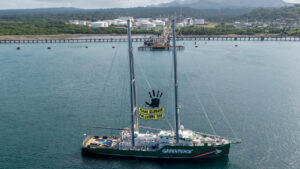
Greenpeace demands COP28 action
ONE of the world’s largest green organizations said it will continue to block access to Shell Pilipinas Corporation’s import terminal in southern Luzon until the Philippine delegation at the COP28 demands accountability from climate-polluting firms.
The blockade involves Greenpeace International and Greenpeace Southeast Asia’s flagship vessel, Rainbow Warrior, and kayaks, hindering Shell’s access to the Tabangao port in Batangas. It started Wednesday morning as world leaders commenced their climate conference in Dubai.
“Our protest will go on until we get a response from the Philippine delegation at the COP28 represented by [Environment] Secretary [Maria Antonia] Yulo-Loyzaga that it will heed the call to make climate polluters pay up for the loss and damage suffered by communities,” Greenpeace Philippines campaigner Jefferson Chua said by telephone.
Timothy James Laurel, government relations advocacy manager at Shell Pilipinas, did not immediately reply to an email and a text message seeking comment.
“For it to happen, the Philippine government needs to advocate for a strong and fair loss and damage facility at COP28. It needs to push for a national legislation that will make climate justice and accountability a state policy to secure accountability for impacted communities,” said Mr. Chua.
While Greenpeace Philippines recognized remarks from the Philippine government that developing nations must fulfill their climate finance promises, it said the country must also demand that corporations pay reparations and pursue a green transition.
“The call has been for developed countries to pay up and deliver climate action. What we are saying is that not only developed countries should deliver but also big corporations that continue to damage the environment,” Mr. Chua said.
President Ferdinand R. Marcos, 66, on Wednesday vowed that the Philippines will “use this (COP28) platform to rally the global community and call upon nations to honor their commitments, particularly in climate financing.”
“We are once again poised to lead,” he told the beneficiaries of the Philippines’ P1-billion People’s Survival Fund, a long term finance stream that was institutionalized through a 2012 law that amended the Climate Change Act of 2009.
Separately, Philippine environment chief Ms. Yulo-Loyzaga said at a Wednesday briefing that the negotiation for a loss and damage fund will be one of the most critical agenda during the UN climate conference.
After a long fight, we now have loss and damage on the agenda,” she said. “We anticipate at this point that there will be many issues relating to climate-vulnerable countries that will be addressed by this loss and damage fund.”
“We need an assurance and commitment from the government that big polluters like Shell will be held to account,” Mr. Chua said.
Greenpeace’s vessel, with a banner that read “Make Climate Polluters Pay,” has been anchored in front of the terminal since the first day of the blockade.
Greenpeace had yet to assess how the blockade has affected Shell’s operations but Mr. Chua said the Tabangao port is key to the entry of various petroleum products into the country.
The Shell Import Facility in Tabangao, also known as SHIFT, was previously one of the country’s two oil refineries that had been holding about 100,000 barrels of oil daily.
SHIFT, which Shell calls a world-class import terminal, was inaugurated in 2021. In the same year, Pilipinas Shell said that through the facility, it would be able to meet fuel demand not just in the capital region but also in Southern Luzon and Northern Visayas.
Mr. Chua said the Philippine government also needs to assure that it will explore options for climate litigation “against big polluters,” which he said has already been done by other governments.
For example, the state of California sued five corporations such as Shell, BP, ExxonMobil, Chevron, and ConocoPhillips as well as the trade American Petroleum Institute for allegedly deceiving the public over dangers linked to fossil fuels and causing billions of dollars in damage to communities and the environment.
“There are also residents from a small island in Indonesia who are taking Holcim, a Swiss cement company, to court for damaging the environment,” Mr. Chua added. “Litigation can be through different means.”
Scientists worldwide have warned that rising global temperatures caused by destructive activities are making typhoons more powerful. — Kyle Aristophere T. Atienza



